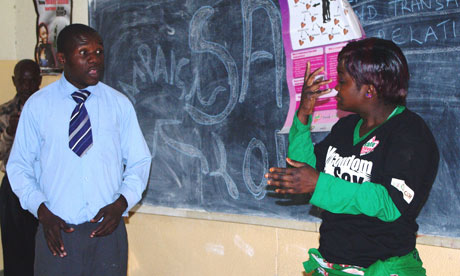
Amos Simbeye grew up in a world of silence. Until he began attending a school for deaf children in Lusaka, Zambia, he had limited ways of communicating and few opportunities to learn about sex.
In a country where 14.3% of the adult population is HIV positive (pdf), Amos and other deaf young people are for the first time being included in sex education, thanks to Safe Love clubs.
The groups were set up as places to discuss and put into action messages from the Love Games television series, a Zambian soap opera that focuses on relationship issues, including HIV.
There are an estimated 16,000 people in Zambia with hearing disabilities. Because many of the young people in this group begin their education late, they are often older than other high school students and are, therefore, more likely to be sexually active. However, though the Safe Love clubs started in 2011, classes for the deaf were launched only two months ago.
Ben Miti, executive director of the Latkings Outreach programme, one of the partners of the initiative, said the decision was made to set up a club at Munali high school, Lusaka, after health workers discovered high levels of HIV among deaf young people there.
The school has a department for deaf children and young people, and when 127 students who attend it were tested for HIV, 48 were found to be positive.
Miti said: "Many of these young people have completely missed out on the conventional messages about safe sex. Lots of warnings are given out over the radio or on television, which is something they are cut off from. There is no programme designed specifically for the deaf. Even at health rallies, people use megaphones to give their messages and they are again left out.
"When we saw the results we felt there was a need for an intervention. There weren't any HIV programmes where deaf young people could go to learn. We realised we had to engage them and that we needed to open a Safe Love club here. When we launched it we actually had too many members for one group so we now have two."
At the Safe Love club, the group's facilitator, Humphrey Chileshe, writes the words "Intergenerational and transactional sexual relationships" on the board and asks members in sign language if they know what it means. Students take it in turns to give their opinions about the words, which they are learning for the first time, before Chileshe explains step by step what they mean.
Large age gaps between couples and young people having sexual relationships for material gain are common problems in Zambia. Amos, 27, lost his hearing after contracting meningitis as a child. He says the Safe Love club has changed his life: "Before I joined Safe Love I was not fully aware of HIV and Aids. I used to proposition girls at school for sex. When I joined Safe Love I became aware of the danger of HIV. I learnt many lessons for the first time and have now stopped such behaviour."
There are 262 Safe Love clubs in Zambia as part of the HIV prevention campaign Safe Love: Think. Talk. Act. The initiative is run by the national HIV/Aids/STI/TB council and the ministry of health, with support from the United States Agency for International Development (USAid), through the US President's Emergency Plan for Aids Relief.
The clubs are used to discuss messages raised in the soap opera, which has just begun its second series in Zambia. They include issues such as some of the risky behaviours that drive HIV in the country, including a high rate of concurrent sexual partners and low condom use. The series, which is promoted as "A group of friends navigating the tricky worlds of love and relationships in the time of HIV", has proved to be a popular talking point among the target age group of 15 to 49-year-olds.
Kangwa Chileshe, a pastor who is also an actor in the series, says taking on the role has proved controversial: "Not a day goes by when I don't get messages about it and people asking questions. There are websites about the controversy, but the fact that people are talking about it shows that they are watching it and thinking about the messages."
Emily-Ann Elliott travelled to Zambia with the International Reporting Project

